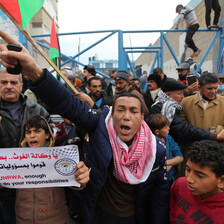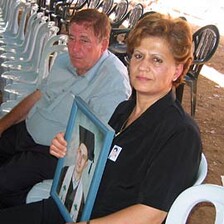Christian Aid 24 March 2003
Of all the images associated with the Occupied Palestinian Territories of the Gaza Strip and the West Bank, extreme hunger is not the first to leap to mind. It is more likely to be the usual television pictures of tanks and guns, angry crowds and stone-throwing youths.
But today, children in Gaza, according to UN figures, are now as seriously malnourished as children in Congo and Zimbabwe.
It is true that violence is commonplace. But for those politicians and activists wishing to find a solution to the troubles in the Occupied Palestinian Territories, it is simplistic and destructive to think exclusively in these terms.
It appears the Israeli government’s main method of controlling the violence is to use tanks and planes, machinegun posts and concrete walls. But control of violence does not equate to peace
That Israelis are entitled to security is beyond question. The ability to take your family to a café or for a meal in Jerusalem or Tel Aviv without the threat of your loved ones being massacred by a suicide bomber, should be a given.
But Christian Aid believes such security will never come without justice for Palestinians. It is easy to say - yet it will take a great deal of faith and maturity .on the part of Israelis and Palestinians to achieve. Otherwise the likelihood is that the cycle of violence and hatred will continue.
As I write, the United Nations is feeding around 1.6million Palestinians in the West Bank and the Gaza Strip. UN food hand-outs are divided among the World Food Programme, which feeds 500,000 Palestinians in the refugee camps, and the United Nations Relief and Works Agency (UNRWA), who distribute food to a further 1.1 million people.
By the end of March UNRWA will have run out of food stocks, unless international governments pledge more funds.
Why should so many Palestinians, ostensibly living in a first world country, need food? As a UN spokesman put it: ‘This is a political problem, a problem completely created by human actions.’
The Israeli policy of closing down the West Bank and the Gaza Strip, of denying Palestinians the ability to travel into Israel to work and to sell their goods means in some areas as many as 80 per cent of the Palestinian population are unemployed. According to the World Bank, the Palestinian economy is on the verge of collapse.
With little work available, families cannot afford to buy food and they and their children are going hungry. Lyla Azam,41, and her family, are a typical case study. I spoke to her among the weeds growing outside her breezeblock shack in her village, El Moghraga, near Gaza City. It is bordered on one side by barbed wire and a smooth, new Israeli road, which she is forbidden to use on pain of death.
Her two youngest children were playing on the rocky path outside, near the road. A few hundred yards away stood an army checkpoint and an Israeli tank, a sophisticated weapon of war being used to keep people like Lyla at bay. As if to make the point, the tank, gleaming in the midday sun, loosed off a few lazy rounds from its machine gun, towards Lyla’s house.
She knew the drill, gathering her two babies together and ushering them into the bedroom -the safest room in the house. The room nearest the road is pockmarked with bullet holes and is permanently out of bounds. The whole family now sleep in this one room.
She has three more children who arrived from school as we talked; they too automatically took shelter in the bedroom. They had walked home across a muddy track between houses destroyed by Israeli tanks and bulldozers. The tarmac highway, straight enough to satisfy the most demanding Roman centurion, is for use by Israeli settlers and the army, not for Palestinians.
Lyla said she was scared living there. Sometimes Israeli tanks drive on to the track outside her home and troops raid her village. In 2001, they took several men from the village and shot them. But she has no choice. Her husband, Atlha 42, has a fractured hip and one failed kidney, and cannot find work.
She doesn’t see her husband, who leaves the house after breakfast - which usually consists of black tea and bread - until nightfall. He is too depressed and humiliated to show his face during the day.
Her five children were showing clear signs of malnutrition, a growing problem in the Palestinian territories. Without an income, Lyla relies on the charity of neighbours, themselves on the breadline, and handouts from aid agencies.
Lyla is not a terrorist. And neither are the vast majority of Palestinians She is just a poor woman trying to survive and feed her family. But poverty can be a fertile ground for violence and gives further cause to the minority of extremists - particularly hunger wrought by human hand.
This increasing and grinding poverty was the subject of Christian Aid’s latest report - Losing Ground, Israel poverty and the Palestinians. At the launch, International Development Secretary, Clare Short, said: ‘The world has agreed… that the answer is two states side by side, two states with two people where both people can be safe and get security.
‘Without political progress there will be no normality re-establishing itself - it will go on getting worse, in the tide of fear and crisis and bitterness that have engulfed the two people.’
Jeff Halper, an Israeli-Jewish friend of Christian Aid recently explained it to me like this: ‘If you put your boot on the throat of a man and push on his wind pipe, he will struggle and fight. He will try and hit you and struggle free. But if you let him breathe, he will have no need to strike you.’
Palestinians frequently talk of the ‘hypocrisy’ of the US and UK’s attitude to Iraq whereby Saddam Hussein is being threatened by huge military force because he has flouted UN resolutions.
There are a tranche of UN resolutions, which apply to Israel, requiring Israeli troops to withdraw from the West Bank and Gaza and for the government to dismantle the illegal Jewish settlements in the Occupied Territories. But the international community has been unwilling to impose them on Israel.
Christian Aid believes in the state of Israel. It believes in security and justice for Israelis. It also believes in a free state of Palestine and justice and security for Palestinians. The two go hand-in-hand. Without justice there will be no peace.
Related Links:

